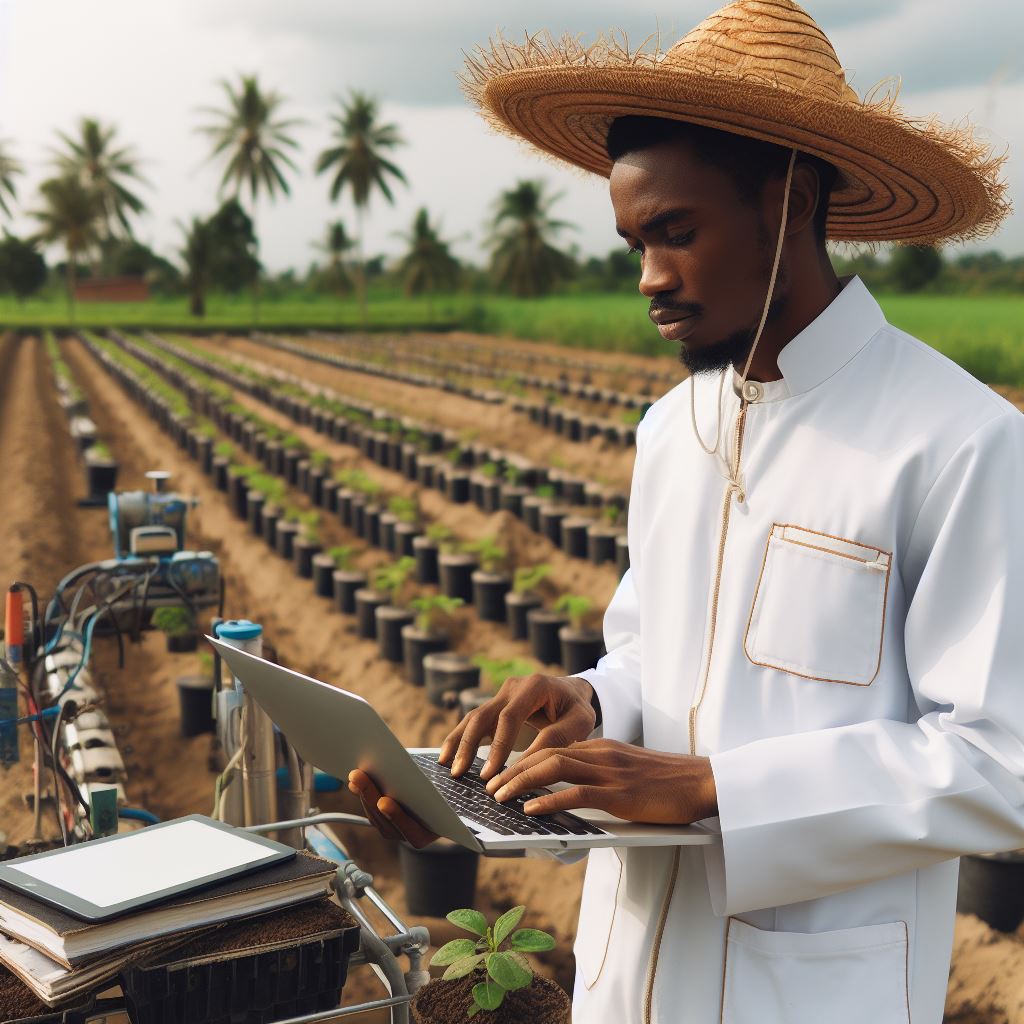Introduction
Crop science education is vital, shaping agriculture, sustainability, and food security.
Understanding its evolution unveils impactful insights.
In Nigeria, the evolution of crop science education stands pivotal in agricultural development.
Over time, this discipline underwent substantial transformations.
This blog section navigates through the historical landscape of crop science education in Nigeria.
From its early stages to current advancements.
The importance of crop science education cannot be overstated.
It underpins agricultural practices, innovation, and adaptation.
Throughout this blog, we’ll delve into the pivotal milestones, challenges faced, and the transformative impact of crop science education.
Nigeria’s agricultural sector relies on skilled professionals equipped with modern crop science knowledge. These experts drive innovation and progress.
The focus here lies on tracing the trajectory of how crop science education in Nigeria evolved. Understanding its roots and transformative phases.
Crop science education empowers farmers, researchers, and policymakers to tackle modern agricultural challenges. It’s a cornerstone of sustainable farming practices.
As Nigeria navigates economic diversification, the significance of well-rounded crop science education intensifies.
We’ll examine how educational institutions adapted curricula, incorporating technological advancements in crop science education.
The evolution of crop science education reflects societal changes, technological advancements, and global agricultural trends.
This blog post aims to shed light on Nigeria’s journey in cultivating a robust crop science education system.
Stay tuned to explore how crop science education in Nigeria has evolved, adapting to meet contemporary agricultural demands.
Historical Overview of Crop Science Education in Nigeria
Early stages of crop science education in Nigeria
- Crop science education in Nigeria can be traced back to the pre-colonial era.
- During this time, traditional agricultural practices were passed down through generations.
- These practices focused on cultivating crops to meet the needs of the local communities.
- There was little formal education specifically dedicated to crop science at this stage.
Influence of colonial rule on the development of agricultural education
- With the arrival of colonial rule in Nigeria, agricultural education began to undergo changes.
- The British introduced new farming techniques and crops to increase economic productivity.
- They established experimental farms and encouraged the adoption of modern agricultural practices.
- This led to the need for formal education in crop science to support these advancements.
Establishment of agricultural schools and colleges
- As agricultural education gained importance, the Nigerian government established agricultural schools.
- In 1920, Moor Plantation School of Agriculture was established in Ibadan.
- It was followed by the establishment of other agricultural schools in different regions.
- In 1955, the Federal College of Agriculture was established in Moor Plantation, Ibadan.
- These institutions provided formal education and training in various aspects of crop science.
Growth and expansion of crop science education in Nigeria
- Over the years, crop science education in Nigeria has experienced significant growth.
- More agricultural schools and colleges were established across the country.
- These institutions offer degree programs in agronomy, plant breeding, crop protection, and more.
- The curriculum has evolved to incorporate modern agricultural practices, technology, and research.
- Research institutes and agricultural extension services have been established to further support crop science.
Challenges and future prospects of crop science education in Nigeria
- Despite the progress, crop science education in Nigeria still faces challenges.
- Lack of adequate funding and infrastructure hinders the development of the sector.
- There is a need for collaboration between academia, industry, and government to address these challenges.
- Efforts are being made to emphasize the importance of sustainable agriculture and environmental conservation.
- The future of crop science education in Nigeria lies in continuous improvement, innovation, and adaptation.
In fact, the evolution of crop science education in Nigeria has come a long way from traditional practices to modern institutions.
The influence of colonial rule and the establishment of agricultural schools and colleges played a crucial role in shaping the development of crop science education.
However, there are ongoing challenges that need to be addressed to ensure the continuous growth and improvement of the sector in Nigeria.
Read: Comparing Crop Science with Agronomy in Nigerian Varsities
Influence of International Collaboration
Role of International Organizations
International organizations have played a significant role in shaping crop science education in Nigeria.
One prominent organization is the Food and Agriculture Organization (FAO), which has provided technical support and expertise.
The FAO has facilitated the establishment of agricultural research institutions and provided training programs for crop scientists.
Another influential organization is the International Institute of Tropical Agriculture (IITA), which has collaborated with Nigerian universities.
IITA has contributed resources, including funding and research materials, to enhance the quality of crop science education.
Impact of Collaborations with Foreign Universities and Research Institutes
Collaborations with foreign universities and research institutes have been crucial in improving crop science education in Nigeria.
Partnerships with universities in countries like the United States, United Kingdom, and China have led to knowledge exchange programs.
Nigerian students and researchers have had the opportunity to study abroad and learn from experts in crop science.
These collaborations have exposed Nigerian crop scientists to advanced research techniques and technologies.
Joint research projects have resulted in the development of high-yielding crop varieties and innovative farming practices.
Collaborations have also boosted faculty capacity through faculty exchange programs and training workshops.
Specific Initiatives and Programs
Several initiatives and programs have contributed to the improvement of crop science education in Nigeria.
The African Crop Science Society (ACSS) organizes conferences and workshops to promote networking and knowledge sharing.
ACSS has also established an online platform for crop scientists to collaborate and exchange information.
The World Bank-funded Africa Centers of Excellence (ACE) project has supported the establishment of centers of excellence in agriculture.
These centers provide state-of-the-art facilities and training opportunities for crop science students and researchers.
The Nigeria Agriculture Sector Development Program (NASDP) has focused on capacity building in agricultural research and development.
NASDP offers scholarships and grants to students and researchers to pursue advanced studies in crop science.
The Green Sahara Project, a collaborative initiative between Nigeria and international partners, aims to address food security challenges.
Transform Your Career with Expert Guidance
Get personalized mentorship consulting that’s tailored to your unique path. Our expert advice is actionable and exclusive.
Get StartedThis project promotes research, education, and sustainable agriculture practices in the Sahel region of Nigeria.
In short, international collaboration has played a critical role in shaping crop science education in Nigeria.
Organizations like the FAO and IITA have provided technical support and resources.
Collaborations with foreign universities have facilitated knowledge exchange and advanced research.
Specific initiatives and programs have further contributed to capacity building and the improvement of crop science education.
These efforts have ultimately enhanced Nigeria’s agricultural sector and contributed to food security.
Read: Fieldwork Insight: Real Stories of Crop Defense in Nigeria
Evolution of Curricula and Teaching Methods
Over the years, the curriculum of crop science education in Nigeria has undergone significant changes.
This has been influenced by various factors, including advancements in agricultural practices and the need to meet the demands of a rapidly evolving agricultural industry.
Changes in the Curriculum
- Increased Emphasis on Basic Sciences: In the early years, crop science education in Nigeria focused primarily on practical aspects of agriculture.
However, with the recognition of the importance of basic sciences in understanding crop production, there has been a shift towards incorporating more science-based courses into the curriculum. - Diversification of Course Offerings: As agriculture becomes more specialized, the curriculum has expanded to include a wide range of courses.
Students can now choose from specialized areas such as soil science, plant pathology, genetics, and agronomy. - Integration of Climate Change and Sustainability: With the growing concern about climate change and its impact on agriculture, the curriculum has been updated to incorporate courses on climate change adaptation, sustainable agriculture practices, and resource management.
- Integration of Entrepreneurship and Business Skills: Recognizing the need for graduates to be self-employed and create job opportunities, crop science education now includes courses on entrepreneurship, agricultural business management, and value chain development.
Adoption of Modern Teaching Methods and Technologies
- Interactive Lectures: Traditional lecture-based teaching has given way to more interactive and participatory teaching methods.
Lecturers now incorporate discussions, group activities, and case studies into their classes. - Use of Technology: The integration of technology has revolutionized crop science education in Nigeria.
Smartboards, projectors, and multimedia presentations are now common in classrooms, enhancing the learning experience. - E-Learning Platforms: The adoption of e-learning platforms has facilitated remote learning and access to a vast array of educational resources.
Students can now access lectures, course materials, and participate in online discussions at their own convenience. - Field Trips and Internships: To provide hands-on experience, crop science education now includes regular field trips to farms, research institutes, and agricultural enterprises.
Students also have the opportunity to engage in internships, where they can apply their knowledge in real-world settings.
Integration of Practical Training and Research Opportunities
- Hands-on Training: Practical training has become an integral part of crop science education.
Students are exposed to practical activities such as crop cultivation, pest control, soil analysis, and crop harvesting to develop essential skills. - Research Projects: Crop science education now emphasizes the importance of research.
Students are encouraged to undertake research projects to conduct experiments, analyze data, and contribute to the advancement of agricultural science. - Collaboration with Industry Experts: Crop science programs in Nigeria have established partnerships with agricultural industries, research institutes, and governmental organizations.
This collaboration provides students with opportunities to work on real-world projects and gain insights from industry experts. - Publication Opportunities: In recent years, there has been an increased focus on publishing research findings and promoting student involvement in academic conferences.
This exposure helps students develop valuable research and communication skills.
In general, the evolution of crop science education in Nigeria has led to significant changes in the curriculum and teaching methods.
The integration of science-based courses, adoption of modern teaching methods and technologies, and emphasis on practical training and research opportunities have enhanced the quality of education and prepared students for the challenges of the evolving agricultural industry.
Read: Career Prospects for Crop Science Graduates in Nigeria

Role of Government and Policy Frameworks
Government initiatives have been instrumental in promoting agricultural education and research in Nigeria.
The establishment of agricultural universities and research institutions has greatly contributed to the development of crop science education.
Policy frameworks and regulations have had a significant impact on the growth and progress of crop science education in the country.
Government initiatives to promote agricultural education and research
- Funding: The Nigerian government has provided financial support to enhance agricultural education and research in the country.
This funding has enabled the establishment of modern facilities and equipment in agricultural universities and research institutions. - Scholarships and grants: The government has introduced various scholarship and grant schemes to encourage students to pursue agricultural education.
These initiatives aim to attract talented individuals into the field and reduce the financial burden associated with acquiring education. - Capacity building programs: The government has implemented capacity building programs to train and empower agricultural educators and researchers.
These programs provide opportunities for professionals to upgrade their skills and stay updated with the latest advancements in crop science.
Establishment of agricultural universities and research institutions
- Federal University of Agriculture: The establishment of the Federal University of Agriculture in Abeokuta has been a major milestone in agricultural education in Nigeria.
The university offers undergraduate and postgraduate programs in various agricultural disciplines, including crop science. - National Crop Research Institute: The National Crop Research Institute in Nigeria conducts research on crop science, genetics, and breeding.
The institution’s findings and innovations have contributed to the advancement of crop science education in the country. - State Agricultural Research Institutes: Several states in Nigeria have established agricultural research institutes to focus on crop science and other agricultural disciplines.
These institutes provide a platform for research, knowledge sharing, and capacity building in crop science education.
Impact of policy frameworks and regulations on crop science education
- Curriculum development: Government policies have influenced the development of the curriculum for crop science education.
The emphasis on practical training, research projects, and industry partnerships in the curriculum enables students to acquire hands-on experience and apply theoretical knowledge effectively. - Research funding: Policy frameworks have facilitated increased funding for crop science research projects.
This has resulted in the development of innovative technologies, improved crop varieties, and better farming practices, which are integrated into the curriculum to enhance the quality of crop science education. - Industry collaborations: Government policies have encouraged collaborations between agricultural universities and research institutions with the industry.
This enables students to gain exposure to real-world challenges and opportunities, fostering a practical and industry-oriented approach to crop science education. - Quality assurance: Policy frameworks and regulations ensure that agricultural universities and research institutions meet certain standards of quality and excellence.
This guarantees that students receive a high-quality education in crop science, making them competitive in the job market and capable of contributing to the agricultural sector’s growth.
In review, the Nigerian government’s initiatives, establishment of agricultural universities and research institutions, and policy frameworks have played a crucial role in the evolution of crop science education in the country.
These efforts have enhanced the quality of education, research, and industry collaborations, resulting in a well-rounded education system that prepares students for the challenges and opportunities in the field of crop science.
Read: Workshops and Conferences for Aspiring Crop Protectors
Challenges and Opportunities
Challenges Faced in Crop Science Education in Nigeria
- Inadequate funding has been a major challenge in crop science education in Nigeria.
- The lack of financial support hinders the development of research facilities and infrastructure.
- Outdated infrastructure in many educational institutions poses a challenge to quality education in crop science.
- The outdated facilities limit the opportunities for practical learning and hands-on experience for students.
- Limited research opportunities in crop science education prevent students from exploring innovative solutions.
- The lack of research opportunities also hampers the development of new agricultural techniques and practices.
- Inadequate access to modern technology and equipment impedes the teaching and learning process.
- Insufficient qualified academic staff in crop science education affects the quality of instruction.
- The shortage of experienced faculty members limits the guidance and mentorship available to students.
- The lack of collaboration between educational institutions and the agricultural industry hampers practical learning.
Potential Opportunities for Growth and Improvement in the Field
- Increased government funding can address the issue of inadequate resources in crop science education.
- Funding allocation towards infrastructure development can modernize educational facilities.
- Partnerships with international institutions can provide access to modern research opportunities.
- Improved collaboration between universities and agricultural organizations can enhance practical learning.
- Investment in training programs for academic staff can improve the quality of instruction.
- Promotion of research grants and scholarships can encourage students to pursue innovative projects.
- Integration of technology in the curriculum can enhance teaching and learning experiences.
- Establishment of agricultural research centers can provide students with hands-on research opportunities.
- Regular updating of curriculum and teaching methods can ensure the relevance of crop science education.
- Promotion of entrepreneurship initiatives can encourage students to apply their knowledge in the field.
Conclusion
In this blog post, we have discussed the evolution of crop science education in Nigeria, reflecting on its past and present state.
We have highlighted the challenges faced in the development of crop science education and the progress made so far.
It is evident that crop science education plays a crucial role in the agricultural sector, contributing to improved crop yield and sustainable farming practices.
It is essential for the continued development and investment in crop science education in Nigeria.
By investing in crop science education, Nigeria can address key agricultural issues such as food security, crop diseases, and climate change.
It will equip future generations with the necessary skills and knowledge to tackle emerging challenges in the agricultural sector.
Crop science education requires ongoing development and increased investment despite existing progress made in this field.
Collaboration between the government, educational institutions, and industry stakeholders is essential to ensure the success and sustainability of crop science education in Nigeria.
The future of crop science education in Nigeria looks promising.
With increased investment, research, and technological advancements, there is great potential for significant improvements in crop production, agricultural practices, and overall food security in the country.
Crop science education is vital for Nigeria’s agricultural sector.
Continued development and investment in this field are imperative for the country’s growth and economic stability.
With a hopeful outlook, Nigeria can pave the way for a brighter and more sustainable future in crop science education.




